Science fiction and dystopian books never really go out of fashion (they may just reach their popularity peak – Divergent/The Hunger Games), and, thanks to its intriguing scenarios, the genre is always the favourite of many. Below are ten of my all-time favourite science fiction and dystopian books (the majority of them are classics!).
I. 1984 [1949] by George Orwell 
Orwell’s 1984 will forever remain the dystopian novel to read. In the story, we meet Winston Smith who rewrites historical records for the Ministry of Truth in Airstrip One (formerly the UK), one of the future totalitarian states. The future world of surveillance, propaganda and brainwashing that the author imagines is a powerful reminder of the importance to stick to the truth and freedom of thought anywhere in the real world. Moreover, the novel has a particular relevance to modern times because there is a global concern now about data protection, fake news and privacy when browsing online.
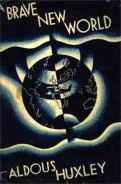 II. Brave New World [1932] by Aldous Huxley
II. Brave New World [1932] by Aldous Huxley
Huxley presents an unforgettable world and vision in his novel. The year is circa 2540, and the humanity made unbelievable advances in genetics, sexual reproduction and sleep-learning. Presented as utopia, the world is actually a well-ordered totalitarian state where there are certain classes of people who should know their societal positions, and where happiness is achieved through a particular drug. The novel is as thought-provoking as it is enjoyable.
III. Do Androids Dream of Electric Sheep? [1968] by Philip K. Dick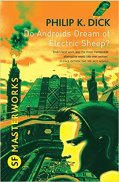
I had so much fun reading this novel by Philip K. Dick. There is movie Blade Runner [1982] that is based on the novel, but, in terms of the plot, it does not do justice to the brilliant novel. Set in post-apocalyptic San Francisco, the story follows Rick Deckard, a bounty hunter, who is tasked with “retiring” a number of criminally-minded androids. Deeply philosophical and clever, the book, which is my favourite of all Philip K. Dick’s creations, introduces new technologies and “religions”, as well as emphasises the future obsession with nature-preservation. For example, live animals are prized above anything else in the story. The book is also full of irony and humour with some instances of suspense.
IV. The Handmaid’s Tale [1985] by Margaret Atwood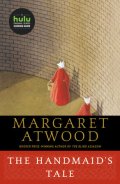
The Handmaid’s Tale is a powerful account of the future whereby women are forced to live in a completely patriarchal society, and the state insists that many women should have only one purpose – to reproduce. We follow Offred, who works as a handmaid in the house of a powerful official of the Republic of Gilead. Offred must have one wish in mind – to get pregnant and produce a healthy child for the master of the house. Atwood’s convincing writing style and the horrific vision of the future presented guarantee that this book is memorable. The science fiction sequel The Testaments is due to be released in 2019.
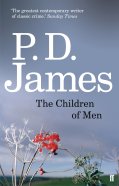 V. The Children of Men [1992] by P. D. James
V. The Children of Men [1992] by P. D. James
The story is set in the future UK when there is mass depopulation and infertility. The country is in the state of chaos and there are various groups who fight for power. We follow Dr. Theodore Faron who gets involved in the activities of one group that tries to establish democracy and justice in the country. This dystopian book starts with despair, but it ends with the hope. If you like the book, it is also worth checking out the excellent film of the same name by Alfonso Cuarón.
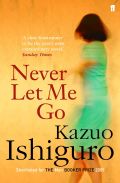 VI. Never Let Me Go [2005] by Kazuo Ishiguro
VI. Never Let Me Go [2005] by Kazuo Ishiguro
“At that stage in our lives, any place beyond Hailsham was like a fantasy land; we had only the haziest notions of the world outside and about what was and wasn’t possible there” [Ishiguro, 2005: 66]. That sentence just conveys the claustrophobic existence of pupils of the Hailsham School, some of whom, while focusing on love and friendship, start to realise later the futility of their personal concerns and joys given their predetermined life purposes. Moving and poetic, Ishiguro’s novel is not only an atmospheric story with an unforgettable futuristic vision, but also a work of intense character development, focusing on love, loss and ultimate disillusionment.
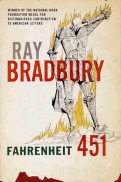 VII. Fahrenheit 451 [1953] by Ray Bradbury
VII. Fahrenheit 451 [1953] by Ray Bradbury
What it would be like to live in the world where books are torched, burned and otherwise destroyed? This is the question that poses Bradbury in his dystopian novel Fahrenheit 451. The title refers to the exact temperature at which a book catches fire, and one of the great things about it is that it demonstrates the importance of books and free knowledge in society, something which should resonate now since modern society is being increasingly digitalised and there are emerging social media monopolies. Only now there is no need to destroy any books since many are collecting their dust on shelves as people are glued to televisions, computers and smartphones. Because of its powerful message, the book is memorable, and the writing – persuasive.
 VIII. The Road [2006] by Cormac McCarthy
VIII. The Road [2006] by Cormac McCarthy
This Pulitzer Prize winner is McCarthy’s tenth novel. It is set in apocalyptic future of great cataclysms, and tells of a father and his son who journey across lands in order to survive the winter. It is a rather grim and depressing read, but the beauty of the language and instances of hope in the story make the novel more than a worthwhile read. The book can be misunderstood, but it presents the world and the relationship which are very convincing.
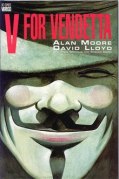 IX. V for Vendetta [1982/89] by Alan Moore and David Lloyd
IX. V for Vendetta [1982/89] by Alan Moore and David Lloyd
In this story, which is also one of my favourite graphic novels of all time, Alan Moore brings his powerful vision forward as he describes the future totalitarian Britain and one masked man with anarchistic ideas who is set on both personal and general revenge. That man, identified only as V, meets a girl named Evey, and their strange friendship provides an emotional fuel to the plot. Although the film of 2005 is very good, the comic actually has more interesting and deeper character development and its plot is also more eventful and thought-provoking.
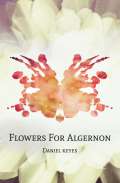 X. Flowers for Algernon [1966] by Daniel Keyes
X. Flowers for Algernon [1966] by Daniel Keyes
Few science fiction books get sadder and more heart-breaking than this book by Daniel Keyes (The Minds of Billy Milligan). Conceived in 1958 as a short story, the author then published the book of the same name in 1966. Flowers for Algernon tells of Charlie Gordon who undergoes a procedure to enhance his mental capabilities since his IQ is only 68. The experiment was performed on him because the previous test subject – a mouse called Algernon – responded successfully to the procedure. The book is an emotionally powerful and moving account, which also incorporates such themes as discrimination against people with mental illness and the elusive aspects of memory.
This list was in no particular order, and it excluded references to the works of H. G. Wells and Isaac Asimov to focus on other authors and books. Do you like the books listed? Do you have a favourite science-fiction novel?


I re-read Brave New World with one of my reading groups a couple of years ago and we were surprised just how well it had stood the test of time. The one book on your list that I would never re-read is Never Let are Go. I think it is brilliant but reading it was such a painful experience the first time round that I couldn’t put myself through a second read.
LikeLiked by 1 person
I agree – Brave New World did stand the test of time. Some of similarly-themed books can now be seen as very relevant and topical since we now see technological advances/concerns that writers writing in the 1930s or 40s could not imagine that well.
Never Let Me Go is a traumatic book – as some others of Ishiguro’s, such as The Remains of the Day and A Pale View of Hills . I reviewed the latter as my first book review and found it too be too mysterious and yes, very sad.
LikeLike
For me, The Remains of the Day is the perfect book. Not a single word is misplaced.
LikeLiked by 1 person
Agreed! A book-masterpiece 🙂
LikeLike
That is odd; it has been years since I read it but I thought “Do Androids Dream of Electronic Sheep” was a story in a collection, not a whole novel?
LikeLiked by 1 person
It is a novel. I am not sure about any sequels or antecedents, but it is a stand-alone book.
LikeLiked by 1 person
Interesting how the memory plays tricks.I must revist the book some day!
LikeLiked by 1 person
Because it is Philip K. Dick, your edition may possibly have included this work with other of his short stories, even though Electric Sheep is not a short story.
LikeLike
Some great choices here and a few I haven’t read. I agree 1984 is still so relevant – maybe even more now than it was at the time. It’s decades since I read Brave New World but I’ve been thinking about a re-read, so I’m glad to hear it has stood the test of time. Have you read We by Yevgeny Zemyatin? Apparently it inspired both 1984 and Brave New World, though I didn’t enjoy it quite as much as either of those. I couldn’t have omitted HG Wells since I’ve been enjoying re-reading all his greats recently, and I’d have to include John Wyndham’s The Day of the Triffids as one of the best science fiction books of all time.
LikeLiked by 1 person
I agree I need to read “We” and “The Day of the Triffids”, thanks for the recommendations. As I put in my post, I specifically excluded H.G. Well because that author deserves a list of his own, surely.
LikeLiked by 1 person
Flowers for algernon was such a great book
LikeLiked by 1 person
Diana — This is a brilliant summary. I agree that Orwell’s Nineteen Eighty-Four (spelled out in the title originally) stands by itself at the top. It’s a brilliant satire, putting Orwell in a class with Jonathan Swift. It’s an uneven book — uneven as is true of many great works; this is perhaps accounted for by the passion and intensity of opinion and feeling that must have underlaid its conclusion. I have only a nodding acquaintance with “Brave New World,” read parts of “Fahrenheit 451” and saw the film. One thing I do not agree with: that Ray Bradbury was a great (or good) writer. The conceptual framework of the book is intriguing, but it is poorly written in my opinion.
Thanks for posting. Very informative Helpful to would be readers and those interested in political and literary/cultural topics.
LikeLiked by 1 person
Thank you! Yes, Orwell’s 1984 will always be for me at the very top of any science-fiction list. And I actually do somewhat agree with you about Bradbury writing. It is definitely the concept and the setting which impressed me in the book and not the writing as such.
LikeLike
I’ve read my first Ursula K Le Guin this year after a recommendation. I think I’ll return for some more.
LikeLiked by 1 person
I haven’t read any, but I have just read some synopses to her novels, and they do sound intriguing.
LikeLiked by 1 person
Very interesting list. Besides the ones you mention, I would add to my favourite list: Neuromancer by William Gibson, Dune by Frank Herbert, Solaris by Stanisław Lem, and (read just a week ago) Machines Like Me by Ian McEwan.
LikeLiked by 1 person
Thank you, and nice list, too! I want to read “Neuromancer”, and yes, “Solaris” is a great addition. I could not get into “Dune” no matter how many times I tried, and I am still to read “Machines Like Me”, but some of the reviews I read of McEwan’s newest novel are not altogether positive.
LikeLiked by 1 person
Yes, not all the reviews of Machines Like Me are positive; but then, not all the reviews of Ishiguro’s Never Let Me Go were positive, either. While different in many respects, both these novels share some of the same epistemological concerns related to bioengineering and bioscientific interventions, AI, non-biological sentience and bioethics. While I do not think McEwan’s novel is as subtle in execution as Ishiguro’s, I think that a reader who appreciates the Ishiguro novel will appreciate the McEwan novel too.
LikeLiked by 1 person
That is interesting that you compare Ishiguro and McEwan here. I like Ishiguro much more not least because, unlike McEwan, he writes in that subtle, eerie, understated, shall I even say, Japanese tradition/way that is a bit far from McEwan’s fiction. Though both are capable of breaking hearts. To be honest, I read about seven pages of Machines Like Me in the bookstore, including starting from the middle, and it did not grab me the way I thought it would. I only understood some kind of a “love triangle” forming between wife, husband and Adam. Of course, I should read it properly, and I may one day give it a proper shot.
LikeLiked by 1 person
OMG, 1984, The Handmaid’s Tale, and Brave New World are some of my favourite books! Also, I’ve been meaning to read Never Let Me Go for ages. It seems we have a similar taste, so I’m gonna have to check out the rest of these novels 😁
LikeLiked by 1 person
Thanks for the comment! I will be interested to hear your opinion on “Never Let Me Go”. I love discussing Kazuo Ishiguro, he is one of those writers whose work you can talk about for hours and still discover something completely new in the end.
LikeLike
The only book I’ve read by Ishiguro is The Remains of the Day and honestly, I can’t say I enjoyed it. Still, he’s gonna get a second chance to impress me as I really want to read Never Let Me Go
LikeLiked by 1 person
Ray Bradbury was one of the first sci-fi writers that I remember reading on my own, I believe it was The Illustrated Man. Asimov, Niven, and Vonnegut are up there with my favorites.
LikeLiked by 1 person
Great choices! Vonnegut is amazing. I love his Slaughterhouse 5. I don’t think I read Niven, though.
LikeLiked by 1 person
Larry Niven’s “Ringworld” is a must read in my opinion.
On a different topic, I couldn’t find any contact info on your page. If you would like to read my sci-fi short story collection, let me know.
LikeLike
GREAT list, Diana! (I’ve read seven of the 10.) And your concise descriptions of each novel are impressive. Mary Shelley’s terrific “The Last Man” would make my top-ten list. 🙂
LikeLiked by 1 person
Thanks very much! And, a great recommendation, thank you! I have heard about The Last Man, but I guess I was never curious enough to look into it further. I am now adding it to my TBR, and may I say how topical the synopsis sounds – since it talks about “the gradual extermination of the human race by plague”?
LikeLiked by 1 person
Yes, Diana, SO topical for a post you had written in 2018.
“The Last Man” can be kind of wordy, as many 19th-century novels are, but I found the book pretty riveting. As you might have heard, its three main characters are partly based on Shelley herself (in male form), Percy Bysshe Shelley, and Lord Byron, and the story takes place in the late 21st century.
LikeLiked by 1 person